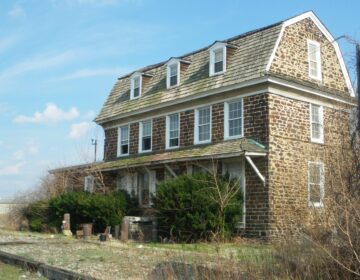NJ’s supreme court asked to intervene in Cooper vs. Virtua EMS fight

The fight for control over which hospital will provide Camden’s paramedic services is now going to the New Jersey Supreme Court.
A lower court last month ruled unconstitutional a law that was quickly pushed through the Legislature giving control of emergency medical services in Camden to Cooper University Health Care. But an appellate court put a hold on that ruling. The state Supreme Court will decide next week if that hold will remain in place.
Cooper scored a swift victory last summer when it pushed for and saw the law enacted.
S-2980/A-4526 allows Level 1 trauma centers –hospitals with the most comprehensive trauma services — to operate paramedic or advanced life support (ALS) services in their home municipalities, and to have “first refusal” over operating local ambulances or basic life support (BLS) services.
Cooper is Camden’s only Level 1 trauma center.
But Mercer County Superior Court Judge Douglas H. Hurd ruled on December 22 that the law was unconstitutional because it “affords privileges to some but not to others” without a rational basis. Opponents of the law pointed it to an example of a health system, led by powerful Cooper Chairman George Norcross, bypassing the state’s long-established Certificate of Need system for determining which hospitals provide paramedic services. Supporters of the law say it will lead to better coordination of patient care in Camden.
The state government appealed Hurd’s decision, and two appellate court judges issued an order on December 29 putting the ruling on hold until a full appeal is considered.
That allowed Cooper to take over the city of Camden’s paramedic services on January 2 from Virtua — the three-hospital system that had operated these services in the city and the rest of Camden County for 38 years.
Virtua and Hopewell-based Capital Health asked the New Jersey Supreme Court last week to stop the law from going into effect. While Justice Barry Albin — the justice on duty on New Year’s Eve — didn’t take that step immediately, he did allow the hospital systems to make their case to both the Supreme Court and the Appellate Division, enabling Hurd’s decision to go into effect.
The full Supreme Court will consider the case on January 12 — raising the possibility that Cooper’s operation of Camden’s paramedic services short-lived. Albin’s December 31 action was announced yesterday.
Hurd found that the state didn’t provide evidence that the law had a rational basis, or that the law provided improved, more centralized services.
“As to centralization, the Act will create a piecemeal ALS system and cause a loss of economies of scale that are necessary for a successful ALS system,” Hurd said, according to a transcript of his decision. “The benefits of the regional system in place now are undisputed, and there’s no rational basis to say that the Act will further centralization.”
In a 25-page brief filed yesterday, Virtua and Capital Health argued that the state failed to show that allowing Hurd’s decision to go into effect would cause irreparable harm to Camden residents or that the state is likely to win its appeal. If Hurd’s decision does go into effect, it would invalidate the law and allow Virtua to continue to operate Camden’s paramedics.
Representatives for Cooper have argued that the need for the law was rooted in Newark-based University Hospital indicating that it no longer wanted to provide BLS services in Camden. University Hospital operated Camden ambulances as a legacy from it being a part of the statewide University of Medicine and Dentistry of New Jersey. The hospital was separated from the university when UMDNJ was largely merged into Rutgers University in 2013.
Cooper representatives have said that the law would allow paramedics to better coordinate patient care with the local trauma center. For example, paramedics could check on patients’ progress after the patients are discharged from the hospital. The state’s two other Level 1 trauma centers — University Hospital and Robert Wood Johnson University Hospital in New Brunswick – already provide both paramedic and ambulance services in their home cities.
That means that the law’s primary effect falls on Cooper — an issue that was at the forefront of the lawsuit, which argued that the legislation was unconstitutionally crafted to benefit Cooper.
In addition to requiring that Level 1 trauma centers operate local ALS paramedic services, it gives these hospitals the opportunity to take over BLS ambulance services.
Another provision of the law allows Level 1 trauma centers to ask for an “expedited” Certificate of Need review to operate paramedic services in the municipalities where a hospital that’s part of the same system as the Level 1 trauma center is located. The provision affects Hamilton in Mercer County, where Robert Wood Johnson University Medical Center could seek to take control of paramedic services from Capital Health. This prompted Capital Health to join the lawsuit.
Cooper spokeswoman Wendy Marano said yesterday that the transition to Cooper operating both paramedic and ambulance services went well.
On January 2, Cooper “began providing both Basic Life Support and Advanced Life Support services in the city of Camden,” Marano said in an emailed statement.
“Camden residents now benefit from an EMS service which is fully integrated with southern New Jersey’s only Level 1 Trauma Center, Cooper University Hospital,” according to Marano. “We again thank the New Jersey Legislature who voted in an overwhelmingly bipartisan fashion to grant Cooper the honor and privilege of providing the highest level of emergency care to the people of Camden.”
The Senate passed the law 28-11 only 17 days after it was introduced, while the Assembly voted 58-16 in favor of it on the same day. Gov. Chris Christie signed it 11 days later.
Virtua CEO Richard P. Miller compared the speed and force with which the law was lobbied for and passed to that used in “Communist China.” Miller said the day before the law was passed that it benefited one man — Norcross. A Norcross spokesman said at the time that Miller’s comments about the law’s financial effects showed that Miller was more focused on Virtua’s profits than the quality of care that Camden residents receive.
_______________________________________________________
NJ Spotlight, an independent online news service on issues critical to New Jersey, makes its in-depth reporting available to NewsWorks.
WHYY is your source for fact-based, in-depth journalism and information. As a nonprofit organization, we rely on financial support from readers like you. Please give today.




